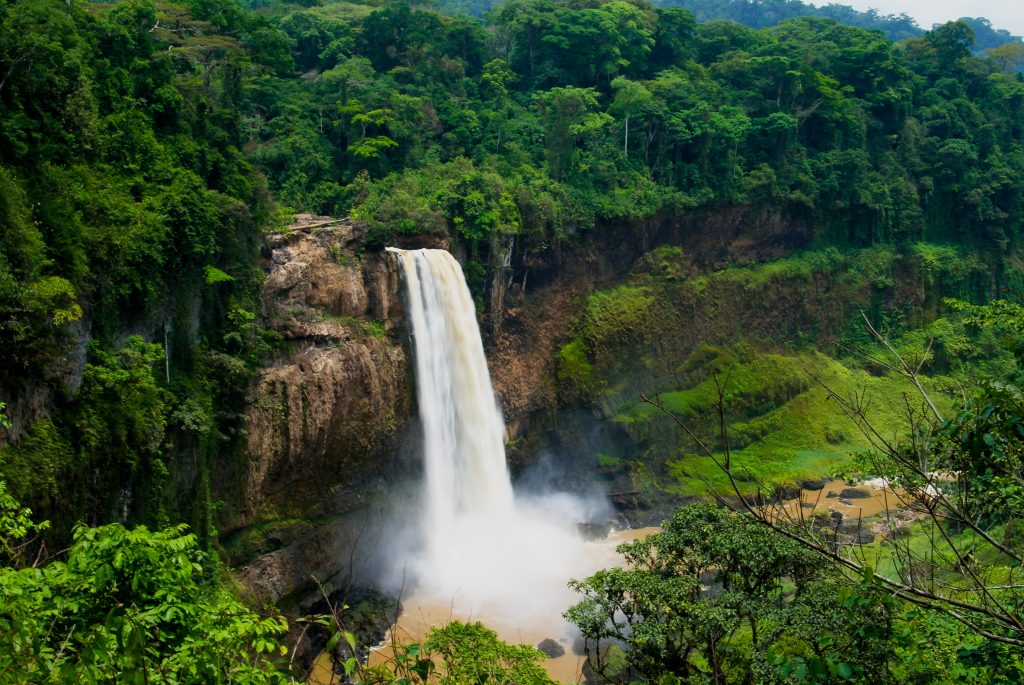
Cameroon, host to some of the most biodiverse places on Earth, became the third country in UNEP-WCMC’s National Ecosystem Assessment Initiative (NEA Initiative) to validate its national ecosystem assessment.
National endorsement
On January 27th 2022, Cameroon announced the validation of its national ecosystem assessment, a comprehensive knowledge-base on biodiversity and ecosystem services and its linkages to people to support decision-making within the country.
The validation of the assessment was the outcome of a two-day workshop in the town of Mbankomo, south-east of Yaoundé. This national event was attended by high-level representatives, civil society, and international organisations, including the Minister of Environment, Hele Pierre, the National Focal Point for the Intergovernmental Science-Policy Platform on Biodiversity and Ecosystem Services (IPBES) Joséphine Eloundou, and the co-chair of the assessment and Director in the Ministry of Justice, Prudence Galega. After the opening ceremony, Ms. Galega spoke to the press, emphasising the importance of the knowledge and data brought by the assessment process.
Cameroon’s national ecosystem assessment process and findings
Cameroon – alongside Colombia, Ethiopia and Vietnam – joined the NEA Initiative in 2017. The completion of the assessment is the result of a collaborative work carried out by a team of 50 authors and experts.
In March the Cameroon NEA team and the Sub-Global Assessment Network hosted a global presentation of Cameroon’s assessment, highlighting the achievements and impact of Cameroon’s findings to support decision-making.
Key findings from Cameroon’s assessment include:
- Cameroon’s representativeness, abundance and diversity of ecosystems and species is exceptional, ranking 4th in Africa.
- However, all the parameters on biodiversity and ecosystem services indicate decline on species, reduction in the extend of some ecosystems (forest, savanna, coastal) and loss of potential services.
- This is most severe in the semi-arid area. Cameroon is among the countries recording the highest number (61%) of endangered and critically endangered species in the Guinean forests of West Africa.
- The most common drivers for the transformation and loss of biodiversity and ecosystem services in Cameroon are uncontrolled, unsustainable, and inappropriate planning of development activities like small-scale agriculture, agribusinesses, infrastructure, urbanization, mining, and exploitation of non-timber forest products.
- Under all biodiversity and ecosystem services scenarios, models and development options, the potential of Cameroon’s nature to reduce poverty and improve well-being remain largely untapped.
- Spatial planning for biodiversity and ecosystem services conservation and sustainable management, sustainable food and energy production, and enforced environmental safeguards are the three key policy options to reconcile biodiversity and ecosystem services conservation with Cameroon’s development needs and increase contribution to human well-being by 2030.
From validation to action: next steps
Cameroon is now embarking on the use of assessment findings stage, aiming to identify ongoing and future processes where assessment findings could guide the consideration of the full value of nature in decision-making.
During the global presentation session, IPBES NEA focal point Joséphine Eloundou delivered an insightful presentation on the country’s next steps. She emphasised that, “an enabling environment to catalyse actions is much needed because this ambition of living in harmony with nature will only be possible with the involvement of all the stakeholders and relentless support of the technical and financial development partners”. She highlighted the need to advocate for the integration of biodiversity and ecosystem services in Cameroon’s National Development Strategy for 2030 (NDS30). Madame Eloundou also insisted on the need to support and develop the Platform for Science-Policy Interface on Biodiversity and Ecosystems Services – alongside defining priority research areas to fill the knowledge gaps identified during the country’s national ecosystem assessment to build capacity to support science-based policy and decision-making.
The United Nations Development Programme (UNDP) will support Cameroon in the use of assessment findings, through the catalytic BES Solution Fund. Managed by UNDP through the Biodiversity and Ecosystem Services Network’s (BES-Net) and generously provided by the Federal Ministry for the Environment, Nature Conservation, Nuclear Safety and Consumer Protection of the Federal Republic of Germany and SwedBio, the BES Solution Fund will support action on tangible solutions emerging from the recommendations of the national ecosystem assessment.
The National Ecosystem Assessment Initiative at UNEP-WCMC is part of the Biodiversity & Ecosystem Services Network (BES-Net), working in partnership with UNDP and UNESCO. Financial support for Cameroon’s national ecosystem assessment and the NEA Initiative is being provided by the International Climate Initiative (IKI) of the Federal Ministry for the Environment, Nature Conservation, Nuclear Safety and Consumer Protection of the Federal Republic of Germany.